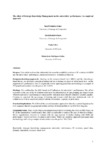Mostrar o rexistro simple do ítem
The effect of Strategic Knowledge Management on the universities’ performance: An empirical approach
| dc.contributor.author | Fernández-López, Sara | |
| dc.contributor.author | Rodeiro-Pazos, D. | |
| dc.contributor.author | Calvo, Nuria | |
| dc.contributor.author | Rodríguez-Gulías, María Jesús | |
| dc.date.accessioned | 2022-05-19T10:19:57Z | |
| dc.date.available | 2022-05-19T10:19:57Z | |
| dc.date.issued | 2018 | |
| dc.identifier.citation | Fernández-López, S., Rodeiro-Pazos, D., Calvo, N. and Rodríguez-Gulías, M.J. (2018), "The effect of strategic knowledge management on the universities’ performance: an empirical approach", Journal of Knowledge Management, Vol. 22 No. 3, pp. 567-586. https://doi.org/10.1108/JKM-08-2017-0376 | es_ES |
| dc.identifier.issn | 1367-3270 | |
| dc.identifier.uri | http://hdl.handle.net/2183/30699 | |
| dc.description.abstract | [Abstract]: Purpose. This article explores the relationship between the availability and use of IT solutions for SKM and the universities´ performance, measured in terms of scientific production. Design/methodology/approach. Drawing on the resource-based view (RBV) and the Knowledgebased theory, we develop a conceptual framework for exploring the effect of SKM based on IT on the organization’s performance that we empirically test by applying panel data methodology to a sample of 70 Spanish universities over the period 2011-2014. Findings. We confirm that the SKM based on IT influences the university’s performance. This effect is positive in the case of the IT solutions referred to the infrastructure of data grouping and more evident when the university’s performance is measured by indicators more directly related to scientific quality. Contrary to expected, the percentage of training and research staff that uses institutional tools of collaborative work is negatively related with the universities´ capacity of publication. Practical implications. We followed the system dynamics approach to identify a causal diagram and a flow sequence that lets us group universities in three different profiles in the KM flow diagram. Originality/value: First, we develop a conceptual framework for exploring the effect of SKM based on IT on the organization’s performance that could be applicable to analyse the case of other knowledgedriven organizations. Second, in contrast with the large number of studies dealing with SKM and performance focused on firms, we analyse universities. Third, our empirical approach used panel data methodology with a large sample of universities over the period 2011-2014. | es_ES |
| dc.language.iso | eng | es_ES |
| dc.relation.uri | https://doi.org/10.1108/JKM-08-2017-0376 | es_ES |
| dc.rights | Atribución-NoComercial-SinDerivadas 4.0 | es_ES |
| dc.rights.uri | http://creativecommons.org/licenses/by-nc-nd/3.0/es/ | * |
| dc.subject | Strategic knowledge management | es_ES |
| dc.subject | University performance | es_ES |
| dc.subject | IT solutions | es_ES |
| dc.subject | Panel data | es_ES |
| dc.subject | Dynamic simulation | es_ES |
| dc.subject | Resource based view | es_ES |
| dc.title | The effect of Strategic Knowledge Management on the universities’ performance: An empirical approach | es_ES |
| dc.type | info:eu-repo/semantics/article | es_ES |
| dc.rights.access | info:eu-repo/semantics/openAccess | es_ES |
| UDC.journalTitle | Journal of Knowledge Management | es_ES |
| UDC.volume | 22 | es_ES |
| UDC.issue | 3 | es_ES |
| UDC.startPage | 567 | es_ES |
| UDC.endPage | 586 | es_ES |
Ficheiros no ítem
Este ítem aparece na(s) seguinte(s) colección(s)
-
II - Artigos [564]






